Victoria Police install surveillance cameras at Monash University’s pro-Palestine encampment
Police have warned universities to allow only enrolled students on campus, amid a “strong likelihood of violence occurring” at pro-Palestinian encampments.
Victoria
Don't miss out on the headlines from Victoria. Followed categories will be added to My News.
Victorian universities have been warned to only allow students entry to their campuses amid a “strong likelihood of violence occurring” at pro-Palestinian encampments.
Victoria Police Deputy Commissioner Neil Paterson said a number of people from the protest camps being investigated over criminal offences have no association with the institutions.
He is calling on vice-chancellors to actively take “steps to exclude people from their campuses who are not there as part of the universities and in short are troublemakers”.
He has written to the state’s university vice-chancellors warning them of the likelihood of ongoing violence and criminal behaviour from non-student agitators.
“After encampments are set up we do typically see an escalation of violence,” Deputy Commissioner Paterson told the ABC on Friday afternoon.
“Many of the people who have entered university grounds are not even associated with those universities and they are certainly agitating and causing an escalation of tensions between groups with opposing views,” he said.
“We don’t want to see those scenes play out here at our universities in Victoria so we are taking proactive steps to ensure lawful protests can occur, but making sure tensions are kept to a low level and that people respect each other,” he said.
In the letter to the university chiefs he said police “believe there is a strong likelihood of violence occurring between protest and counter-protest groups, as well as other criminal offences occurring such as property damage if the encampments continue to grow in size”.
But he stopped short on Friday from suggesting the police would move in.
“We are not asking the universities to break up the protests – protests are lawful,” he said.
The police and university heads will hold a meeting to discuss the situation.
Police set up cameras at Monash Uni pro-Palestine encampment
Mobile surveillance cameras have been erected by police at Monash University after outside activists hijacked student encampment protests.
Police were called to the university’s Clayton campus on Wednesday to investigate an incident, in which pro-Palestine activist Mohammad Sharab allegedly swore at and abused Jewish students as they walked past.
Mr Sharab is on bail over charges of alleged kidnapping and assault.
Footage shows Mr Sharab agitating Jewish students at the university on Wednesday.
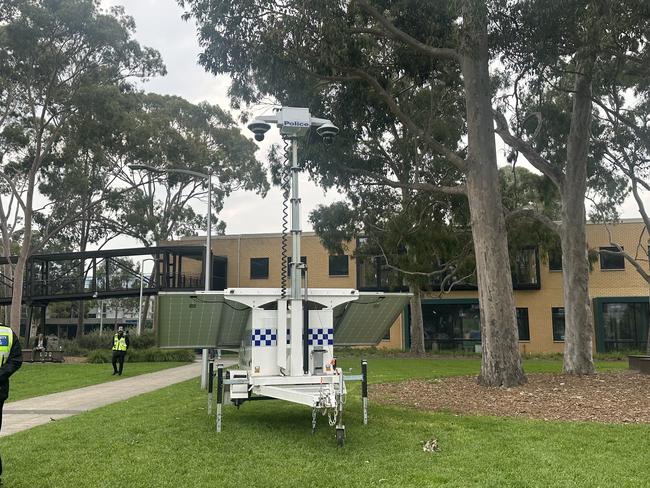
In an email to staff on Thursday, Monash University Professor Sharon Pickering, vice chancellor and president, said instances of conduct on the Clayton campus had been witnessed that were neither peaceful or allowed for the freedoms of others.
“There have been examples of conduct over the past week that might be found to be criminal offences or civil wrongs, including antisemitic or Islamophobic speech, or acts of harassment or vilification,” Prof Pickering said.
“Among such conduct have been repeated acts and speech of people with no links to the University community.
“Calling in outside agitators must stop now. Criminal and civil offences, as well as the hostile general atmospherics have a cumulative impact on our campus community.
“Students, including those protesting and counter-protesting, have repeatedly called police in relation to the behaviour of others – many from outside the University community.”
Prof Pickering said instances of disruptive, racist and offensive behaviour could lead to students being referred to Victoria Police.
“Students and members of the community who are engaged in protest have repeatedly requested Victoria Police to attend campus on several occasions over the past week.
“As a result, Victoria Police will provide an ongoing community policing presence on campus to ensure the safety of students and staff.”
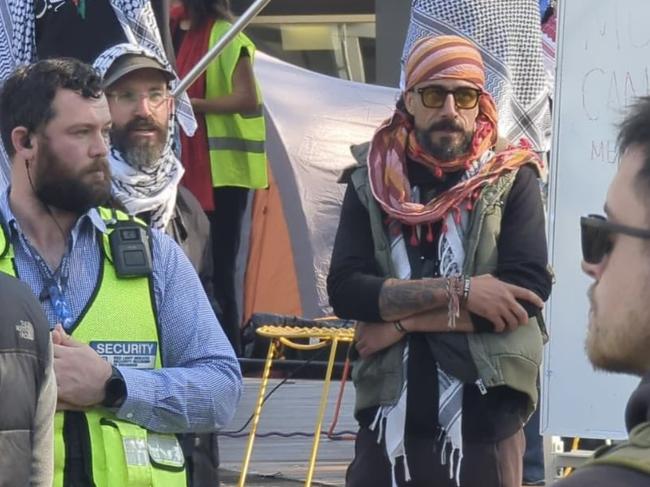
It comes as the Monash Student Association (MSA) at the university’s Clayton campus also voiced concern with the recent violence seen at the encampment.
“The MSA has and always will recognise and support all students in asserting their right to protest peacefully,” the association said in a statement.
“The MSA is gravely concerned with the recent violence seen at the encampment on campus and has been in contact with University administration to ensure the safety of all people involved.”
The association called on protesters to demonstrate peacefully and for the university to ensure those protesting are able to do so safely.
In response to this statement, Students for Palestine Monash called on the association to call out “far-right groups and Israel supporters” for their “repeated attacks” on the encampment, including alleged damage to tents and a gazebo.
“Student unions should stand unequivocally against war, apartheid and genocide, as they did during the Vietnam War, and the movement against apartheid in South Africa,” the group said.
“Pro-genocide protests have no place on campus. The MSA needs to take a stand.”
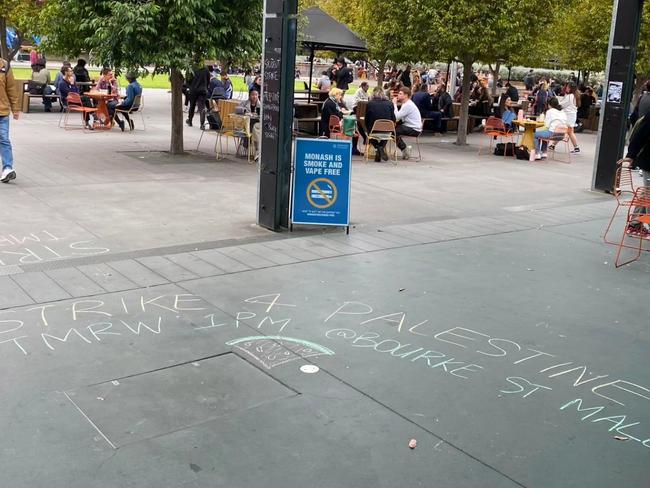
It comes after tensions reached boiling point at Monash and Deakin universities on Tuesday as Palestine and Israel supporters clashed at “solidarity with Gaza” encampments, leaving one staff member with cuts and bruises.
The mood at Monash University was mostly calm among students at the encampment on Thursday, where peaceful demonstrations are being held on the Clayton campus’ Lemon Scented Lawns.
Tensions flared after Monash security removed chairs being used as barricades around a pro-Palestinian protest site.
Students yelled “shame” at security as they carried the chairs away.
Protesters said they created the barricade to keep them safe from far-right activists.
Victoria Police has been contacted for comment.
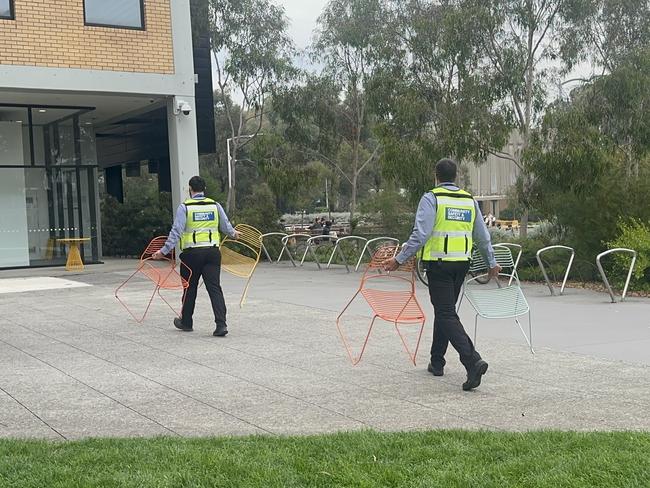
University of Melbourne accused of ‘silencing’ staff
Meanwhile, the University of Melbourne has been accused of “silencing” its staff members amid telling them they must seek prior approval for leave if they wish to attend pro-Palestine rallies.
In a leaked email to staff, deputy vice-chancellor Professor Pip Nicholson said while the university recognised that staff members may exercise their right to express their personal views through participation in the rally, they must do so in their private time.
“Accordingly, staff must seek prior approval for leave (paid or unpaid if they wish to attend the rally during their normal working time (even if their work is self-directed or the absence is for a short duration),” Prof Nicholson said.
It comes after the union organised a staff rally at the encampment on Thursday.
Prof Nicholson said a staff member may attend the rally for the usual duration of their unpaid meal break.
“Staff wishing to participate in a public rally cannot act in a manner contrary to, or unconstrained from, their terms and conditions of employment by unilaterally withdrawing their labour to attend.
“Such action technically puts their employment at risk and may be basis to withhold pay.”
In reply to the email, Unimelb for Palestine students said the university was “silencing” and “bullying” its staff members from showing solidarity with the Palestinian cause.
“Staff members still showed up in their masses and made history today,” the statement said.
Universities seek advice on shutting down slurs
University leaders have been left with minimal answers as to how they can shut down anti-Semitic slurs within their campuses, after Attorney-General Mark Dreyfus said he could not provide legal advice on the matter.
Group of Eight Australia Chair Professor Mark Scott AO and Deputy Chair Peter Høj penned a letter to Mr Dreyfus on Wednesday in the hope of seeking “authoritative advice” on whether controversial pro-Palestine slogans “from the river to the sea” and “intifada” contravened federal law.
“To date no Australian court or relevant authority has made a determination on these phrases that would allow a university to follow precedent in dealing with their use on campuses,” the letter said.
“Group of Eight universities acknowledge that these phrases are deeply offensive to many in the Jewish community.
“We seek urgent guidance from the Australian government to inform our actions going forward as we collectively aim to ensure protest activity on our campuses does not escalate as in the United States.”
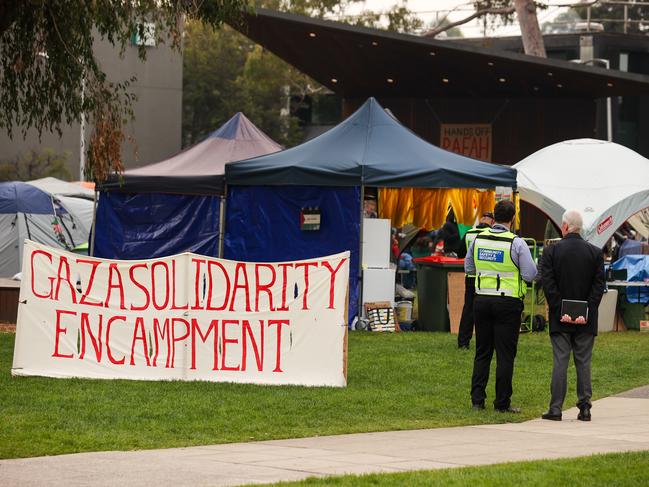
In reply to the letter, Mr Dreyfus acknowledged “no one in Australia should be targeted because of their race or religion” and that all Australians had the right to exercise freedom of speech in a respectful manner.
However, he was not able to explicitly say whether the pro-Palestine chants named in the Group of Eight letter contravened the law.
“While I do not provide legal advice, and note your members are seeking their own legal advice, I trust that the following information will be of assistance,” a letter from Mr Dreyfus to Group of Eight Australia, sighted by the Herald Sun, said.
“Section 18C of the Racial Discrimination Act 1975 makes it a civil offence to do a public act that is reasonably likely to offend, insult, humiliate or intimidate people because of their race, colour or national or ethnic origins.
“A person aggrieved by an alleged act of racial discrimination can make a complaint to the Australian Human Rights Commission.”
The Australian Friends of Palestine Association (AFOPA) has fired back at the Group of Eight Australian universities (G8) who are seeking to ban protesters from university grounds by also seeking to criminalise the use of the phrases “intifada’ and ‘from the river to the sea”.
In a statement from AFOPA on Thursday night, the group said while Adelaide Univeristy vice-chancellor Hoj and his G8 colleagues were concerned about words, these principled students are concerned that their university may be “complicit in a genocide”.
“AFOPA also calls on universities to demonstrate solidarity with their students who are pleading for justice for Palestinians amongst the ongoing atrocities in Gaza and the horror of the occupation,” the statement said.



